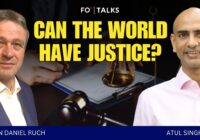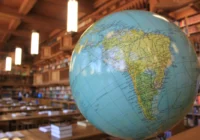Despite economic woes, Africa still presents opportunities, and despite challenges, democracy is marching forward in the continent.
As per an ancient African proverb, the prettiest flowers bloom amidst the sharpest thorns. Amara Konneh, the finance minister of Liberia, is one such flower. This “land of the free” is not quite as free as it sounds. Members of Liberia’s Senate are used to perks and privileges. Konneh wants to trim them and Liberian senators want to send him to jail for his efforts.
Wabenzi Perks
Prima facie, this sounds like yet another horror story from Africa. However, Konneh’s case demonstrates that a new wind of democratization and accountability is blowing through the continent. Named the “2014 African Finance Minister of the Year,” the fact that Konneh’s steady hands guide the country’s fiscal docket is heartening. That he is trimming the perks and privileges of senators is historic.
In Africa, Wabenzi elites have long led a charmed life. They ride in flashy Mercedes Benz cars, drink San Pellegrino sparkling water and wear Rolex gold watches to flaunt their status. Africa has long suffered from the “big man syndrome,” but leaders like Konneh are challenging this culture of ostentation and impunity. Konneh has won plaudits for curbing corruption and waste.
This month, Konneh set his eyes on high-flying senators. He is cutting down their personal allowances for vehicles, homes and other goodies to save Liberia $1.2 million. This may not sound like a lot of money, but Liberia’s economy is in shambles. The 2014 Ebola outbreak killed nearly 5,000 people. One of the poorest countries in the world came to the brink of collapse as businesses folded and foreign investors pulled out. Konneh has been trying to stabilize and revitalize the economy at the time of a global slowdown.
Liberia’s senators have responded by ordering Konneh’s arrest. The Wabenzis are outraged that the finance minister has the temerity to tamper with them. For the moment, the arrest order is in abeyance because one senator has filed a motion for reconsideration. Konneh might still be arrested, but he has challenged the big men of Liberia. It will be hard for them to put the genie of accountability back into the bottle.
Election Sagas
Yoweri Kaguta Museveni has been president of Uganda since 1986. On February 18, 2016, he was re-elected. Like Robert Mugabe, Museveni shows no signs of stepping down. Museveni has melded “state and party, bending institutions to his will, from the security forces to the judiciary.” Kadumba Busingye, a lawyer and a poet, calls Museveni “a sophisticated dictator in a suit.” The wily old fox ruggedly navigated his electoral designs through teeming disgruntled opposition street protests and the cacophony of accusations of rigging. Violence broke out before the election, heralding a chorus of dissatisfaction with the conduct of the electoral process. Since then, armed soldiers have been patrolling the streets of Kampala, the national capital. Their job is to intimidate voters who feel cheated, angry and disenfranchised.
Ugandan elections were far from free. International observers expressed their discontentment with both the overarching democratic climate of the country, and the independence and transparency of the electoral commission. Kizza Besigye, Museveni’s former physician and longstanding opponent, was arrested several times. On one occasion, Besigye was detained for disrupting traffic. More generally, Ugandan authorities argued that Besigye was a threat to peace. The media have been muzzled and there is reason to despair. Yet there is much reason to hope.
This land that has seen the likes of Idi Amin is in every facet, leaps and bounds to the good now. Museveni is not executing his opponents summarily. Besigye addressed large rallies in both urban and rural areas. The latter have historically been Museveni’s stronghold, but large numbers turned up to hear Besigye. On February 13, Museveni and Besigye squared off in the first live television debate featuring a sitting Ugandan president. Prior to this, Museveni had dismissed, out of hand, the idea of a debate as an exercise for schoolchildren. He had to eat his words and rock up for this exercise in his pursuit of power.
Public opinion now matters. The media might be on a tight leash, but social media has come into its own. Political discussions occur on social media such as Facebook and Twitter. Mobile banking enables new candidates to raise money to fund their election campaigns. Museveni still rules but his days on the throne might be numbered.
In Niger, President Mahamadou Issoufou is facing a challenge from Hama Amadou. Elections are underway in this uranium-rich landlocked West African country. The first round has been indecisive despite the fact that Amadou is in jail. This is a great boost for democracy. It shows that people are starting to discover the power of the ballot box. It also shows that challenges to the big men of Africa are becoming more robust.
There are three specific reasons to be optimistic. First, Amadou chose to return to Niger to contest elections. This former prime minister and president of the National Assembly could have stayed in exile, but his return is symbolic of the new trend of Africans coming home to make a difference. Second, Amadou is still running for office despite being locked up on what are believed to be trumped up charges of child trafficking. Third, electoral irregularities are diminishing. Unlike Saddam Hussein, Issoufou is not the only candidate and is certainly not winning 100% of the vote. Regardless of what happens in March, the forthcoming runoff offers reasons to cheer.
International Criminal Court
The International Criminal Court (ICC) has been trying to convict some prominent Kenyans for crimes against humanity. The ethnic violence that broke out in 2007, although brief, killed 1,200 people. Over half a million were displaced. Luis Moreno Ocampo, a former ICC prosecutor, thumped his chest and declared that he would slay the dragons of impunity and injustice. Yet all but two of his cases against the indicted Kenyans collapsed dismally before trial. Remaining in the dock are Kenya’s deputy president, William Ruto, and one other.
An amendment to the ICC’s Rules of Procedure and Evidence, adopted during the 12th session of the Assembly of State Parties, on November 27, 2013, allow the court to use previously recorded and subsequently recanted witness testimony in certain circumstances.
In South Africa, President Jacob Zuma is on the ropes. The fall of global commodity prices has battered Africa’s second-largest economy.
The prosecutor’s case in the two remaining Kenyan cases sought to rely heavily on recanted witness testimony. This month, in what may be the final blow that collapses the last of the prosecutor’s Kenyan cases, the ICC’s Appeals Chamber unanimously rejected the admissibility of recanted evidence. The ICC ruled that its 2013 decision could not be applied retroactively in the Kenyan cases to the detriment of the accused persons.
Some argue that this has given Kenyan politicians the get-out-of-jail free card. It certainly demonstrates the incompetence of the ICC. It conducted shoddy investigations, did not take the time to research the veracity of witness testimony, relied on contradictory evidence by different witnesses, demonstrated a complete lack of understanding of Kenyan sociopolitical conditions, and naively failed to protect witnesses. Some of them have disappeared mysteriously, while others have retreated into the shadows after complaining of intimidation.
Many argue that the ICC targets Africa disproportionately or even exclusively. All cases before it, without exception, involve African countries. Despite appalling atrocities by the Islamic State in Syria, Iraq and beyond, the ICC is yet to investigate any atrocity or charge anyone in the Middle East. Recent revelations are proof that the ICC conducted its Kenyan investigations with cavalier abandon. It faces a real crisis of credibility going forward.
Economic Challenges and Opportunities
In South Africa, President Jacob Zuma is on the ropes. The fall of global commodity prices has battered Africa’s second-largest economy. To add insult to injury, the country’s agricultural sector is facing the worst drought in over a century. Unemployment is at 24.5% and food prices have surged. Finance Minister Pravin Gordhan bluntly declared that the country’s economy was in crisis.
Gordhan cut economic growth forecasts to an anemic 0.9%. He has drawn up a remedial road map to stave off a ratings downgrade to junk bond status. This would increase the cost of borrowing and South Africa would have to pay higher interest rates to issue new debt. Gordhan has presented a new budget with soft tax increases, government spending cuts and a temporary halt on public sector hiring. Despite his efforts, investors remained unconvinced that the economy is back in the saddle. The rand continues to fall.
The African National Congress (ANC), the ruling party, is facing its toughest year since it came to power. Municipal elections are scheduled for later this year. With a wobbling economy, the ANC faces increasing discontent.
Yet it is not all doom and gloom in Africa. Sub-Saharan Africa is urbanizing faster than any other part of the world. By 2030, 50% of its population will live in cities and city dwellers tend to have more money to spend. Hence, retail, financial, construction and technology sectors in cities continue to do well. Lagos, Nairobi, Accra, Johannesburg and even Kinshasa are still boomtowns. Despite the global economic slowdown, African economies continue to present opportunities and canny investors are sniffing around for them. To end with another salient African proverb: A hand that has been licked must, thitherto, not have been empty.
The views expressed in this article are the author’s own and do not necessarily reflect Fair Observer’s editorial policy.
Photo Credit: 360b / Dmitry Kaminsky / Shutterstock.com
 We bring you perspectives from around the world. Help us to inform and educate. Your donation is tax-deductible. Join over 400 people to become a donor or you could choose to be a sponsor.
We bring you perspectives from around the world. Help us to inform and educate. Your donation is tax-deductible. Join over 400 people to become a donor or you could choose to be a sponsor.
Support Fair Observer
We rely on your support for our independence, diversity and quality.
For more than 10 years, Fair Observer has been free, fair and independent. No billionaire owns us, no advertisers control us. We are a reader-supported nonprofit. Unlike many other publications, we keep our content free for readers regardless of where they live or whether they can afford to pay. We have no paywalls and no ads.
In the post-truth era of fake news, echo chambers and filter bubbles, we publish a plurality of perspectives from around the world. Anyone can publish with us, but everyone goes through a rigorous editorial process. So, you get fact-checked, well-reasoned content instead of noise.
We publish 3,000+ voices from 90+ countries. We also conduct education and training programs
on subjects ranging from digital media and journalism to writing and critical thinking. This
doesn’t come cheap. Servers, editors, trainers and web developers cost
money.
Please consider supporting us on a regular basis as a recurring donor or a
sustaining member.
Will you support FO’s journalism?
We rely on your support for our independence, diversity and quality.









Commenting Guidelines
Please read our commenting guidelines before commenting.
1. Be Respectful: Please be polite to the author. Avoid hostility. The whole point of Fair Observer is openness to different perspectives from perspectives from around the world.
2. Comment Thoughtfully: Please be relevant and constructive. We do not allow personal attacks, disinformation or trolling. We will remove hate speech or incitement.
3. Contribute Usefully: Add something of value — a point of view, an argument, a personal experience or a relevant link if you are citing statistics and key facts.
Please agree to the guidelines before proceeding.